#Player Behavior
Explore tagged Tumblr posts
Note
I just finished the finale fight with The Thing That Shatters The Sky. I'm impressed with your patience in the early years of critical hit but especially during this fight there was a lot of off-topic chatter that must have been hard to ignore. I have to ask: did you address that outside the game to get the guys to focus, or did it naturally lessen as the game matured?
A simple question with a complex answer, there are a few things going on.
Yes, an ongoing conversation was, and to a certain degree continues to go on, re: what is a professional real-play experience? how many jokes is too many, how proficient does one need to be with the rules, etc. What you're hearing in those early sessions is a group of people transitioning from playing for fun to playing professionally so as to create a good listening experience (while also having fun).

In those days Stephen was developing his editing and production philosophy for Critical Hit. To be clear, Stephen was already a proficient editor and producer, but he was, in a lot of ways, inventing real-play post production as he went. When we started Critical Hit there were only a few real-play shows out there. Can you imagine? CAN YOU JUST IMAGINE!? So yeah Critical Hit is an edited show, so a lot of stuff ends up on the cutting room floor. As the editor Stephen has a policy about what gets cut and what doesn't and that policy has evolved over the show's decade+ of existence.
And lastly, yes, ultimately the GM ends up as the wrangler of the group, and a lot of factors can affect how much or how little they do it. It's possible that the pressure from the events of the game needed a little release, and so more table chatter was allowed. But honestly it was so long ago that I don't remember.

Thanks for listening!
Oh here's a link to our discord https://discord.gg/Bnp5Z7cv if you have questions about Stephen's editing process that's a good place to ask. That's a 7 day link, I'm not sure if I'm supposed to put out permanent ones.
#questiontime#critical hit#critical hit podcast#real play podcast#early real play podcasts#podcasting#streaming#player behavior#ttrpg#tabletop games#d&d#4e#dungeons and dragons#dnd
18 notes
·
View notes
Text
Product design and psychology: Exploring Gacha Mechanics in Video Game Design
Keywords: Gacha Mechanics, Gaming Industry, Psycho-Manipulation, Player Behavior, Case Studies
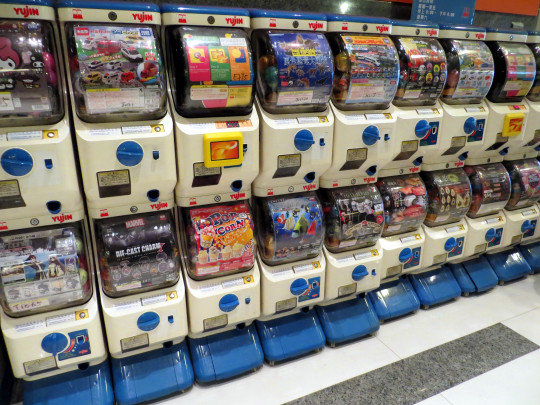
Abstract:
This research paper delves into the intricate relationship between game design and psychology, with a concentrated focus on 'Gacha' mechanics prevalent in the gaming sector. Originating from Japanese toy vending machines, the Gacha system has grown to be a powerful tool in shaping player behaviour. The paper illuminates the conceptual framework underlying Gacha mechanics, emphasizing its capabilities in manipulating player actions and decisions. Through an exhaustive examination, this study presents a detailed understanding of its psycho-manipulative attributes and supports its findings with specific case studies from the gaming industry. The work serves as a comprehensive exploration of the influence and ramifications of Gacha mechanics in contemporary game design.
Introduction:
The Gacha system, inspired by Japanese toy vending machines, stands as a hallmark strategy in the contemporary gaming industry. Fundamental to its design is the 'loot box' principle, where players invest financially with hopes of securing a randomized item, the allure of which varies in rarity. Beyond mere chance-based rewards, this mechanic intriguingly intersects with deep-rooted psychological tendencies, captivating human desires for unpredictable outcomes and rewards. Such mechanics are not mere playful inclusions; they strategically bolster player retention and significantly influence revenue streams. As the following sections will expound upon, the Gacha system is much more than a gaming novelty; it carries potent psycho-manipulative attributes. Through a detailed exploration, this paper seeks to unravel the underlying psychological tenets that grant Gacha mechanics their notable efficacy, further enriching the discourse with industry-specific case studies that spotlight its transformative impact.
Theoretical Foundation of Gacha Mechanics:
Gacha mechanics, now pervasive in the gaming industry, find their roots in the foundational theories of behavioral psychology, particularly the principles outlined by B.F. Skinner concerning operant conditioning. Delving deeper into the theoretical underpinnings of Gacha mechanics, we encounter an alignment with Skinner's variable-ratio schedule—a schedule of reinforcement wherein responses are reinforced after an unpredictable number of responses. This unpredictable nature of reinforcement, as Skinner posited, leads to high rates of response, which persists even in the sporadic or even absent delivery of rewards.
Such a system bears stark resemblance to the operations of Gacha mechanics in games. For instance, in "Fire Emblem Heroes," players use virtual currency—either organically accrued within the game or procured through real-world monetary transactions—to obtain randomized characters. The exhilaration associated with acquiring a rare and formidable character, with its inherent unpredictability, mirrors the principles of gambling, a pursuit universally acknowledged for its addictive qualities. Drawing a parallel, "Genshin Impact" deploys a similar methodology, allowing players to utilize Primogems, the in-game currency, to secure weapons or characters, each acquisition bearing its own element of unpredictability and potential reward.
In essence, these game designs intricately weave the principles of operant conditioning into their fabric, utilizing the powerful allure of unpredictable rewards to foster player engagement. Such mechanisms, grounded in well-established psychological theories, underscore the reason for the profound addictiveness and wide-reaching success of Gacha-based games in contemporary gaming culture.
The Psychological Framework of Gacha Mechanics:
Gacha mechanics can be analysed through the lens of operant conditioning, specifically Skinner's variable-ratio reinforcement schedule. This schedule, characterized by delivering rewards after an unpredictable number of responses, results in a high response rate and resistance to extinction. This parallels the randomized reward mechanism in Gacha systems, which fosters a sense of persistent anticipation and engagement in players.
The Psycho-Manipulative Dimension:
The realm of Gacha mechanics, deeply entrenched in the gaming industry, employs an array of psychologically manipulative strategies designed to maintain player engagement and promote continued monetary investments. Central to this design are mechanisms such as the 'near-miss effect and the 'sunk cost' fallacy, which, when operationalized, tap into core human cognitive tendencies.
The 'near-miss effect is particularly intriguing. It is inextricably tied to the psychological construct of cognitive dissonance, a state wherein players, upon achieving an outcome tantalizingly close to the desired result, experience a tension between expectation and reality. This tension acts as a catalyst, driving players towards further attempts in the game with the hope of reconciling their near victories with an eventual success. The result is an increased commitment, both in terms of time and financial resources.
Complementing this is the 'sunk cost fallacy.' Here, players, having already invested significant amounts into the game, feel compelled to continue their engagement and expenditure to justify their prior commitments. Rather than cutting losses and ceasing further investment, the players become ensnared in a self-perpetuating cycle, driven by the rationale that prior investments must not be rendered futile.
In synthesizing these observations, it becomes evident that Gacha mechanics do not operate in isolation. Instead, they deftly intertwine with key psychological processes, cultivating an environment where players are subtly steered towards continued engagement and, more critically, perpetual investment.
Further Psychological Aspects:
The Zeigarnik effect, where people remember uncompleted tasks better than completed ones, also fuels Gacha mechanics. Incomplete character collections or unachieved rarities compel players to persist. Moreover, the endowed progress effect, where players are more motivated if they perceive they've made some progress, is strategically utilized by Gacha games, often providing a few free pulls or easy-to-earn currencies early on.
Ethical Considerations and Policy Implications:
Gacha mechanics, while undeniably advantageous for bolstering the financial health of gaming companies, stand at the crossroads of significant ethical dilemmas. At the heart of this quandary is their inherent resemblance to gambling paradigms, a feature that holds the potential to cultivate and reinforce addictive tendencies. Such mechanics, with their random reward structures, might not only be captivating but also perilous, especially when considering vulnerable demographics such as minors. Given these potent implications, it is imperative to not only recognize but also proactively address these ethical challenges. As underscored in this paper, there emerges a pressing necessity for the formulation and enforcement of comprehensive regulations and industry-wide norms. Such initiatives would not only safeguard the interests of players but also act as a bulwark against the possible misuse and overextension of these mechanics. In framing these policies, special emphasis should be placed on mitigating potential harm, with particular attention directed towards safeguarding vulnerable populations like minors from the more deleterious influences of Gacha systems.
Case Studies from the Gaming Industry:
Case Study 1: Fire Emblem Heroes
In "Fire Emblem Heroes," the use of the Gacha system has resulted in a highly engaged player base. Players use virtual currency to summon random heroes, with rarer heroes having lower chances of being pulled. The uncertainty of outcomes has been linked to elevated dopamine levels in the brain, thereby creating a pleasurable feedback loop that reinforces the purchase behaviour.
Case Study 2: Genshin Impact
"Genshin Impact" applies Gacha mechanics through its 'Wish' system. The game periodically introduces limited-time banners that allow players to 'wish' for specific characters or weapons. This scarcity principle, combined with the randomized outcomes, effectively exploits the Fear of Missing Out (FOMO) and the desire for exclusivity.
Conclusion:
The Gacha mechanics, deeply rooted within the gaming industry, provide a captivating examination of the confluence of gaming, psychology, and consumer tendencies. This intricate interface goes beyond mere game dynamics, delving into potent revenue-generation avenues while simultaneously raising poignant questions about ethical dimensions and the need for considered regulations within game design. Through an in-depth exploration encompassing theoretical frameworks, real-world applications, and pertinent case studies, this paper has furnished a comprehensive panorama of the Gacha system. Notably, its psycho-manipulative capabilities underscore the dynamic's capacity to both enthral and influence player behaviour. As the research suggests, while the Gacha mechanics illuminate potential avenues for substantial profitability, they concurrently evoke urgent deliberations on the ethical frontiers of game design. Thus, a profound understanding and judicious navigation of these mechanics remain pivotal, ensuring a harmonious reconciliation of business imperatives with paramount player welfare.
References:
Anderson, C. A., & Dill, K. E. (2000). Video games and aggressive thoughts, feelings, and behaviour in the laboratory and in life. Journal of personality and social psychology, 78(4), 772.
King, D., Delfabbro, P., & Griffiths, M. (2010). Video game structural characteristics: A new psychological taxonomy. International Journal of Mental Health and Addiction, 8(1), 90-106.
Kuss, D. J., & Griffiths, M. D. (2012). Internet gaming addiction: A systematic review of empirical research. International journal of mental health and addiction, 10(2), 278-296.
Przybylski, A. K., Weinstein, N., Murayama, K., Lynch, M. F., & Ryan, R. M. (2012). The ideal self at play: The appeal of video games that let you be all you can be. Psychological Science, 23(1), 69-76.
Skinner, B. F. (1953). Science and human behavior. New York: Macmillan.
Suits, B. (1978). The Grasshopper: Games, Life, and Utopia. University of Toronto Press.
Hamari, J., & Lehdonvirta, V. (2010). Game design as marketing: How game mechanics create demand for virtual goods. International Journal of Business Science & Applied Management, 5(1), 14-29.
Festinger, L. (1957). A theory of cognitive dissonance. California: Stanford University Press.
Thaler, R. (1980). Toward a positive theory of consumer choice. Journal of Economic Behavior & Organization, 1(1), 39-60.
Zhang, P., & Ren, J. (2019). How gacha design influences the player experience in mobile games. CHI Conference on Human Factors in Computing Systems Proceedings.
Hamari, J. (2019). Loot boxes are again linked to problem gambling: Results of a replication study. PLOS ONE, 14(3), e0213194.
Macey, J., & Hamari, J. (2018). Investigating relationships between video gaming, spectating esports, and gambling. Computers in Human Behavior, 80, 344-353.
Zendle, D., & Cairns, P. (2018). Video game loot boxes are linked to problem gambling: Results of a large-scale survey. PLOS ONE, 13(11), e0206767.
#Gacha Mechanics#Gaming Industry#Psycho-Manipulation#Player Behavior#Case Studies#product design#psychological manipulation#game design#gaming#user experience#player behaviour#video gaming#player engagement#genshin impact#fire emblem heroes#gachapon
9 notes
·
View notes
Text

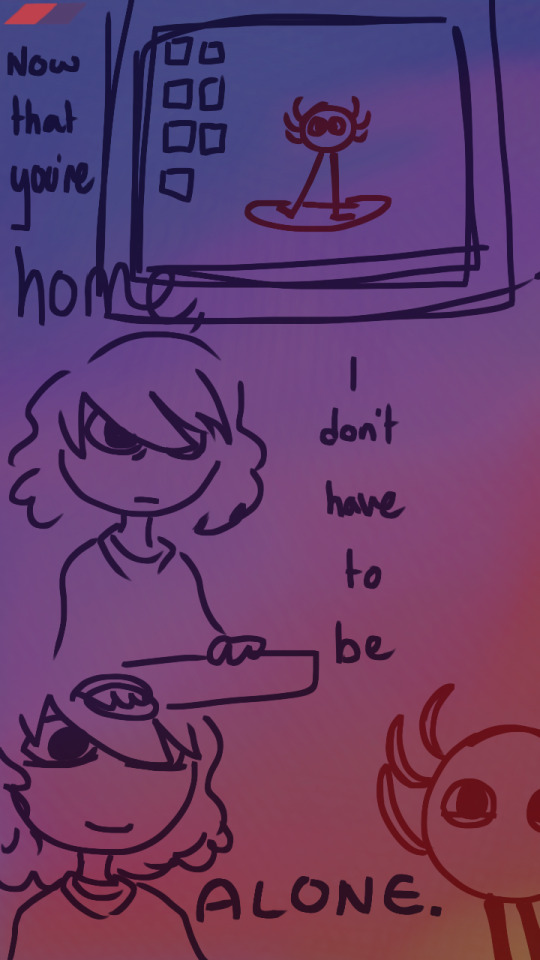
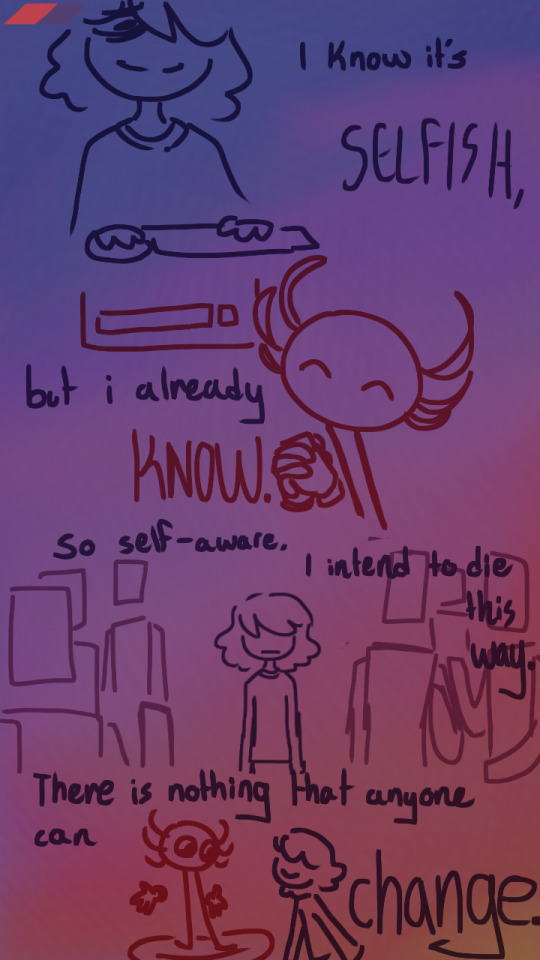
Smthn about escapism and why someone (me) might choose to stay with Kinito even tho he was a bit mean and also didn’t like that u had freewill lol
Also a little bit of thinking abt how Kinito and the Player Who Stays (the Stayer???) share a lot of parallels (working hard to deserve nice things, crippling loneliness, selfish reasons for clinging to one another, self awareness, dissatisfaction/disappointment with their respective realities leading to them idealizing the concept of each other, etc etc)
(The song lyrics are from ‘Woof woof’ by ARTHUR. It took a few listens to rlly appreciate it, now it scratches my brain in v nice ways)
#kinito#kinito my beloved#kinito the axolotl#kinitopet#kinito x y/n#kinito x player#self insert oc#self insert#oc x canon#canon x self insert#woof woof by Arthur#song lyrics#music inspired art#doodles#angst#self awareness#tw obsessive behavior#tw unhealthy coping mechanisms#tw toxic relationship#longing and loneliness#character exploration#I’m ok btw I just had this concept in my brain for th past two days lol#babbitsona#babbit#oc persona
670 notes
·
View notes
Text
Chaos vs. Patronage: How Life Series winners grapple with skill disparity
As the Life Series has gone on and matured into more noticeable patterns, some winners have pivoted to a mentorship/support role to their chosen 'champion'/ a favored player.
Scott spent Limited Life as a duo with Martyn, and then joined a high-skill group in Secret Life that ultimately saw him sacrifice himself trying to get Gem the win. Pearl spent Secret Life with her stated goal being one of her teammates winning, pivoting to support Scar at the end when they'd died. Now in Wild Life, she has outright stated her intent to support Impulse to get the win. (Scar supporting Jimmy in Wild Life may also fit this pattern; we'll get to that.)
In contrast, winners Grian and Martyn² are not sticking to that single-minded attempt to get a player to win, whatever it takes. They will express support for teammates winning, but generally do not take actions that would worsen their own chances of winning/surviving to help a teammate. They aren't playing "meta", which here means putting all their resources into one person.
These two categories of behavior ultimately reflect the Winners' approaches to answering the question of how to balance disparate skill levels in the series cast. (Second half of writing + footnotes under cut.)
Grian has spent game after game altering mechanics & playing with randomization to try to level the playing field without directly intervening against specific players.³ Martyn is invested enough in the narrative/story that making less-than-optimal decisions isn't hard for him or atypical (this is the player who beelines for the Nether every single season).
It seems like Scott and Pearl realized they're very strong players and are interested in nerfing themselves more actively... but they still don't want to throw the match. The compromise there is to put their effort & skill towards helping another player achieve victory.
A case could be argued that Scar is moreso the former group by nature (he's similar to Martyn in his penchant for making entertainingly bad decisions that render nerfing unecessary). However, after witnessing multiple seasons of Scott & Pearl acting as mentors, seeing them compete head-to-head in the game he ultimately won, mentorship now seems like a normalized route to take once you're a winner.⁴
¹ Unsure if BigB in LimL counts? They were a duo, but Scott fomenting Martyn's win seems to be what kicked off Pearl's dedication to support another player.
² Cleo is a winner but they do not fit this analysis for a variety of reasons I don't want to get into. So I won't, bc this is a tumblr post & not an academic paper. Ignore that there are footnotes and an academic-ass title
³ Grian seeing Scott win: "Oh no I've created an unbalanced game. Ok lets randomly assign players together to try to balance things... why has RNG betrayed me?!" RNG does not stop betraying him btw. I have another post in draft about this but it's kind of nuts how dedicated Grian is to Not Rigging The Game Even A Little.
⁴ Incidentally imo this is what will force Grian in the next few games to either end the series, create dual winners/some other atypical win structure, or bust his ass trying to get a second win & break that taboo. Based on his game design so far, he can put up with a bit of interference, but ultimately will not abide "we all do schoolyard tradesies on who gets to win until everyone gets one".
#life series#traffic series#life series meta#idk what to tag this tbh#anyways yes this is technically a player behavioral dichotomy noticeable in non winners to an extent#that has to do with prioritization of entertainment/novelty/story vs raw skill/ gameplay#but it becomes much more evident with winners
235 notes
·
View notes
Text
Kieran has me in a chokehold. His character arc is so GOOD. You can tell that his bitterness and anger doesn’t just come from everything that’s happened to him recently. It’s pretty obvious that he’s been living in Carmine’s shadow for a LONG time and she’s always kinda treated him badly. But it wasn’t until the player character came along that he was finally able to voice that in his own way;; Just when he thinks he’s made a true friend in someone, someone that can and will stand up to his sister and is able to defeat her in battle (which inspires him to start speaking up for himself more), Carmine steals them away. And that’s a big betrayal to him. He clearly has self esteem issues which leads to him thinking that Carmine was talking shit about him behind his back and getting the player to believe that he wasn’t worth being friends with. And that makes him think both of them were laughing at him and making fun of him. And THEN the player goes and takes the last thing that Kieran has, the last thing he truly cares about: Ogerpon. It’s no wonder he got so frustrated and petty and lashed out 😭 Still breaks my heart to see but they did a really good job showing that progression of him losing more and more of his patience with Carmine. And him generally feeling like everything he cares about is being torn away. And losing to the player over and over just makes things WORSE. He’s not strong enough to beat them, he’s not strong enough to stand up to his sister, he’s not strong enough to be worthy of Ogerpon, he’s not strong. He needs to get stronger. Stronger and stronger and stronger.
GODDDD. He’s going to live rent free in my brain forever now. I can’t wait to see the direction they take with him in The Indigo Disk
#Pokemon#Pokemon SV spoilers#Pokemon Scarlet and Violet#Pokemon DLC spoilers#Kieran#The Teal Mask#Pokemon Kieran#Pokemon SV#Ogerpon#Pokemon Carmine#Also don’t even get me started on his unhealthy attachment to Ogerpon. Probably also due to Carmine and his general upbringing and behavior#AND how he starts to view Ogerpon as more of a tool/object than a living being#When Carmine was like ‘Bro you’re fighting over who gets to keep Ogerpon? Don’t you think you should let OGERPON choose??’#He wasn’t being considerate to Ogerpon’s feelings at all 😭#He probably thought that by getting to keep Ogerpon he’d gain back some sense of control. And also power over the player#God my poor poor boy. I hope things resolve for you in TID#Shima speaks
2K notes
·
View notes
Text
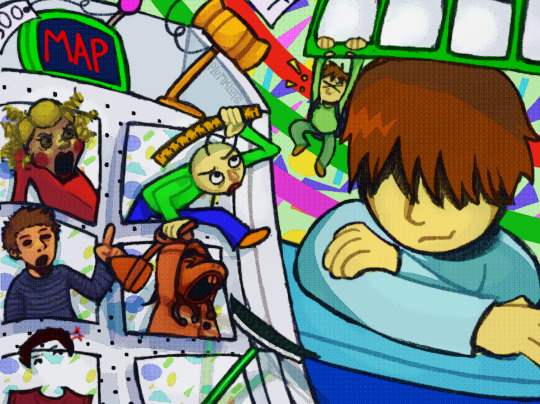
baldi's basics brainrot is real and its winning bru😭😭😭😭
#baldis basics#baldi fanart#baldi#dr reflex#mrs pomp#the principal of the thing#gotta sweep#baldis basics null#player design may or may not have been inspired from basics in behavior#im so normal about this game#ibispaintx
1K notes
·
View notes
Text
max really goes about his days threatening retirement to whoever will listen and praises charles to people who ask him stupid questions
#king behavior#he really said I feel a disturbance in the lecfosi force and CLEARED everyone#he said im the true leader yall are just here for a short stay#also acting like he didn’t say he was gonna race charles for the next 15-20 years#shut up boy with your relegated football team player haircut#lestappen#they said max only rates charles and no one else
490 notes
·
View notes
Text
If there's any explanation/clarification needed feel free to go with it in the tags/replies. It's not flawless.
#ffxiv#partner and I regularly disagree on behavior of the player base#i know we arent ✨everybody✨ in the fandom#but Tumblr players are the ones I care about 😂#i never see complaints here just love#and i feel like we value storytelling over completionism but maybe im wrong
370 notes
·
View notes
Text
you know what fuck it, tumblr posts that make me think of rrverse hermes









#he's so#important#he's probably the most important player in the game right now#he's in The Most societally crucial position and one push away from a complete psychotic breakdown at any given time#what a combination#pjo hermes#riordanverse#pjo hoo toa#toa#trials of apollo#(bc that's where we got the Context of the gods behavior)#i may be kinda obsessed with him#but objectively#he Truly Is where the narrative is taking us next in the apollo and olympus storyline#and i will die on that
83 notes
·
View notes
Text
what's better than this, 2/3rds of the mlb scared to death of ghosts and then kiké hernandez being like i have a ghost at home, she's my best friend, and i am dtf. ok king [mlb]
#never heard justin verlander speak and 🤨#real talk why do all these teams booking their players to stay at the milwaukee hotel#like what kind of sicko behavior is that. all these men are terrified#anyway. in order:#willy adames#cody bellinger#<- no whimsy#justin verlander#<- he wants 2 believe#kiké hernández#<- can't say it or tumblr will hide it#evan carter#kyle schwarber#corbin carroll#logan webb#michael harris ii#shohei ohtani#andrew mccutchen#<- dreamboat with sense#spencer strider#<- deeply no whimsy#vinnie pasquantino#baseball#mlb#neon tagging all the teams got me shook rip#san francisco giants#new york yankees#los angeles dodgers#texas rangers#RAN OUT OF TAG SPACE. bye
91 notes
·
View notes
Text
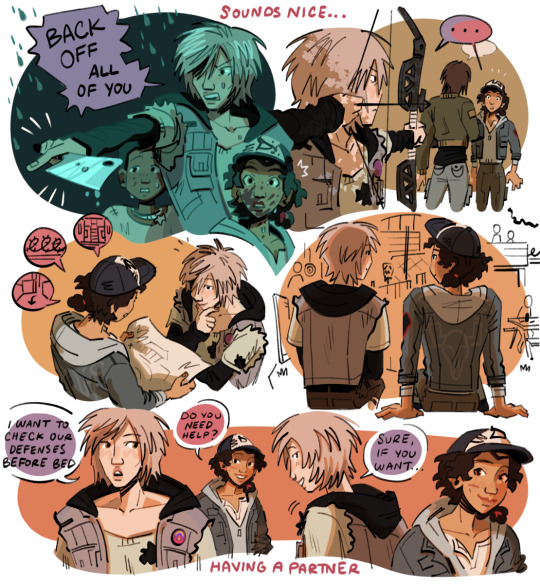
"sounds nice... having a partner"
#the walking dead game#twdg#violentine#clementine twdg#violet twdg#MAANN when clem says this in s3 JUST WAIT BBY#people who say clemvi has no basis like ep2 isnt just them working as a team for 2 and a half hours regardless of player choice#like be fr#clem telling louis that violet patching up the back wall is ok because she needed something to keep herself busy. married behavior#vi asking clem to help check in on everyone while she deals with the wall. their shared smile when she comes back outside :)#and then they sit in the leadership spot together overlooking the yard and everything theyve planned together coming to fruition :)#sorry i just think their romance set up in eps 1 and 2 is obvious as FUCK and im tired of (Some) people pretending it isnt#'i havent seen her warm up to someone in a long time' brody literally tells clem that vi seems to like her after its been 24 hours#after shes been a block of ice for a whole year. and clem just melted those walls down immediately while they fought walkers together#violet is so devoted to clem post ep1 its embarrassing for her#'i saw she had you pinned and i- shit i got So crazy...' sorry if you dont think shes in love with clem idk what to tell you#'i'll tear that boat apart before we leave without you' i know you would girlie!!!#the animators went CRAAZAYAYAYAY the way they look at each other... their little smiles at each other....even before the belltower#the way clem looks at her while they dance.... the way she puts her head down on her shoulder so contentedly....#and then she keeps her head on violets shoulder as she pulls away so clems chin gets dragged with it like she doesnt want to let go#'so you never forget that night' 'i never will' they are DISGUSTINGLY in love with each other it makes me physically ill#its 2024 and im still hearing 'i just didnt see it :/'. lazerbeams you#spaced art 2024
682 notes
·
View notes
Text
deeply funny to think about the Drifter trying to interact normally in the Origin system while their consciousness is ping-ponging back and forth between Duviri (time loop) and 1999 (time loop).
They have no compunction about being completely honest with people because they are used to everyone forgetting everything they say when the loop resets. They don't treat their own possessions with any care because they absently assume they will pop back into existence tomorrow. They forget to eat or sleep for long stretches because (you guessed it!) their physical well-being would usually reset too. They cheerfully abandon any task they're undertaking to satisfy their curiosity because "it'll be there next time."
What a weird little freak. I love them.
#In other words--they act like the player of a particularly engaging videogame.#I also imagine the Hex seeing this behavior at first like 'what the Fuck is your Deal'#and then as their extended time loop continues they start to pick up bits and pieces of the same mindset#they get less rigorous about maintenance and repairs each time December comes back around#they start to trust in the Loop as well as in each other -- there's always more to do. of course. but they can always try again.#how nice for a group of people who fought so hard to earn just one more chance#Warframe 1999
97 notes
·
View notes
Text

Whenever I think the Agatha fandom couldn’t possibly get any weirder, I just log onto twitter and see the actually insane things people will tweet out of their own free will.
What do you mean you took a picture of a stranger’s ass and posted it online without their consent?
What do you mean you publicly make super weird and parasocial and honestly really gross remarks about Kathryn and other cast members just to get likes and attention?
What do you mean you stalk the cast online because you have no shame or sense of boundaries?
The obsession with AI in fics and fanart, being super weird to Joe Locke, turning a blind eye to a cast member’s Zionism as well as her being a Depp apologist because you think she’s attractive, overall acting like a Salem Seven hive mind type of group. Just weird fucking behavior.
#Agatha all along#agathario#it’s always the same offenders too and just when I think I’ve blocked them all boom another player enters the chat#I also get loving a show and loving the cast#but you do not know these people and they do not know you#also stop fucking taking pictures of strangers in public especially of someone’s ass like who the fuck raise you people#freak behavior tbh 🫶🏻#I could go on about how it’s one particular side of the fandom doing this but it’s kinda obvious who it is lmao#also idgaf if ‘that’s just stan twitter’ you’re being fucking weird#also I’m not done yet some agathario stans are biphobic as HELLLLL and that is coming from a lesbian
85 notes
·
View notes
Text
Someone said this already but I’ll point it out again that Jimmy is an unreliable narrator and a manipulator that spins and alters the narrative/tone of every scene he’s in with each character.
This sentence also applies to Curly.
Too many people are taking how Jimmy talks to Curly and how Curly is actually responding at face value when between Anya and Curly he is again the second most affected by his presence. This is to say he changes how he is acting drastically when dealing with Jimmy in a more similar way Anya does than people are willing to admit.
#like idk why we just accepted that yeah Jimmy is also saying truths about curly or that curly is the only one#unaffected by Jimmy’s behavior like I also see people saying Curly is an unreliable narrator and while he has some biases his perception#of reality and acknowledgment of things that challenge his views make him completely different#like he is aware of what’s actually happening he’s just handling pretty badly like idk for people who don’t want to trust his words all the#facts you get about Anya in the game come from his friendly commentary about her and his thoughts so I guess we throw that out?#it’s just not everything is a parallel for Jimmy and curly as player characters sometimes it really is to show how#different and disingenuous Jimmy is about things as Curly is the only other perspective we get#mouthwashing#mouthwashing game#curly mouthwashing#jimmy mouthwashing#anya mouthwashing
94 notes
·
View notes
Text

#OoC note: based off of the statements and behavior of my Orchis player#in her defense she went six sessions without taking a structure#alas#the assimilation maw is not kind
125 notes
·
View notes
Text
Hockey gossip accounts are doing detrimental things to society I fear
#let us all burn actually#like why do you guys memorize how many people a player is following#in the meanest way possible#get a life#get a grip#this is not normal behavior actually
40 notes
·
View notes